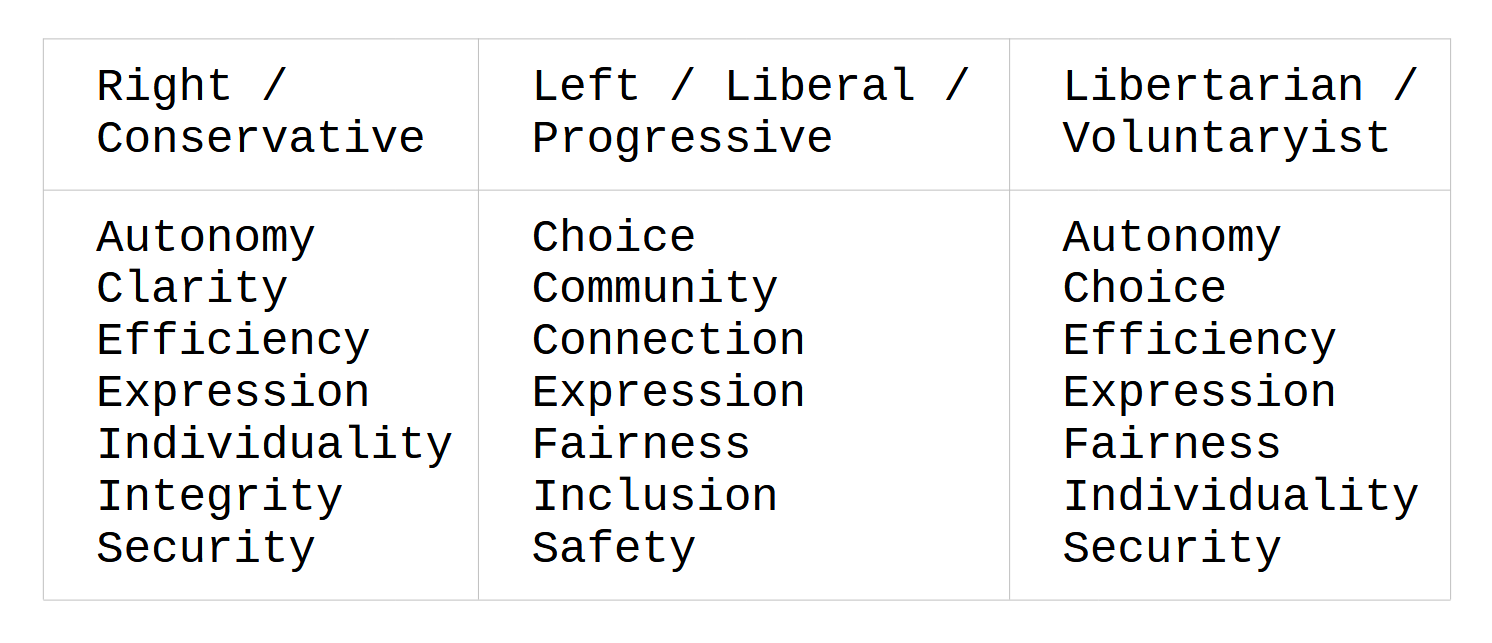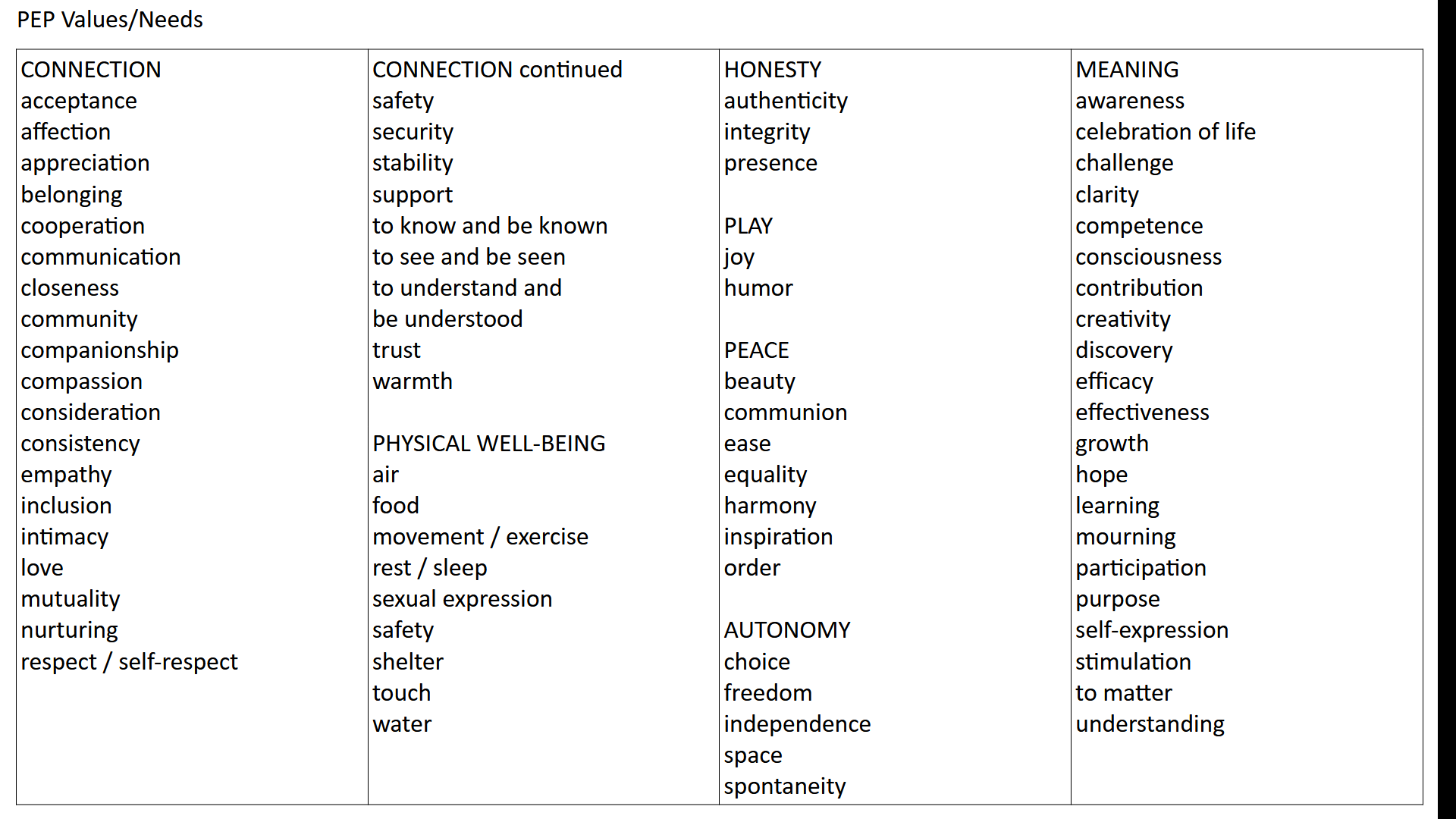14 minute talk on Chapter 15 – Politics (Gracefully deal with differing political ideas and actions) from the A Practical EmPath: Rewire Your Mind book by Scott Howard Swain.
video created with the help of AI tools
14 minute talk on Chapter 15 – Politics (Gracefully deal with differing political ideas and actions) from the A Practical EmPath: Rewire Your Mind book by Scott Howard Swain.
Some political conversations from the book
Conversation 1, technically, not full PEP, but better than a punch in the face
Emma: “I can’t stand how the other political party always pushes for more regulations. It stifles freedom.”
Alex: “Does it feel like they are restricting personal choices?” Note: “feel like” can be a signal that the words following it will not be a real feeling, but let’s not get caught up in such strict adherence to perfection.
Emma: “I believe in individual freedom and responsibility.”
Alex: “So, you value autonomy and see less regulation as supporting that autonomy?”
Emma: “Yes, personal freedom is crucial for me.”
Conversation 2
Jordan: “I don’t understand why some are so against gun control. It’s about public safety.”
Harper: “The information you have heard points to gun violence being a major problem?”
Jordan: “It is! Guns are dangerous tools that allow anyone to cause harm to innocent people!”
Harper: “Are you feeling anxious because you value safety and security?”
Jordan: “Yes, it’s about keeping people safe.”
Harper: “So, for you, it’s important that laws enhance the overall safety of the community?”
Jordan: “Definitely. That’s my main concern.”
Conversation 3
Sara: “I hate how taxes are used for things I don’t support, like war and propping up failing corporations. It feels like theft.”
Derek: “It sounds like you value autonomy and efficiency?”
Sara: “Yes, I want to choose where my money goes.”
Derek: “Is it important for you that your values align with how your taxes are used?”
Sara: “Absolutely. I want my contributions to reflect my values.”
So far you’ve seen examples of empathizing that seemed to lead nowhere. First, they lead to more connection, which can (not always) eventually lead to curiosity and an open mind in the person you are empathizing with, like in the examples below.
Conversation 4
Carlos: “It frustrates me when people oppose welfare programs. They seem so uncaring!”
Maya: “Are you feeling upset because you value community support and fairness?”
Carlos: “What did you call me!?”
Maya: “Oh I may have been unclear. I was asking if it can be upsetting when people oppose welfare programs you see as helpful.”
Carlos: “Oh. Yes!”
Maya: “Would you say that comes from you seeing so much value in community support and fairness?”
Carlos: “Yes, I think it’s important to support each other.”
Maya: “Is it about wanting a society where everyone gets the help they need?”
Carlos: “Absolutely, it’s about caring for each other.”
Maya: “So, because you care so much for others, you want disadvantaged people to get the consideration and resources they need?”
Carlos: “Exactly! You seem to really get where I’m coming from. How do you feel about all this?”
Conversation 5
Lucy: “The idea of completely free markets seems so dangerous!”
Tom: “Sounds like you’re concerned about safety and security?”
Lucy: “Yes, I worry about what happens to those who can’t compete.”
Tom: “Are these concerns rooted in your values for fairness and community?”
Lucy: “Yes, I believe in protecting those who are vulnerable.”
Tom: “Would you say you really value keeping people safe?”
Lucy: “To the extent practical, yes… But Tom…?”
Tom: “Yes?”
Lucy: “I appreciate you really listening to me! You seem to really understand my perspective on this issue. I know you have libertarian leanings, so I’m wondering what your thoughts are on free markets?”
Generalized list of potential values / needs for 3 of the “teams”:

The full values / needs list:

Briefing Document: “Chapter 15 – Politics” from A Practical EmPath: Rewire Your Mind
Summary: This document summarizes the core themes and ideas presented in Chapter 15 of A Practical EmPath: Rewire Your Mind, which focuses on applying the book’s “Practical Empathy Practice” (P.E.P.) framework to the realm of politics. The chapter addresses the difficulty of empathizing with those holding opposing political views, explores the underlying values that drive different political ideologies, and provides exercises for practicing both self-empathy and empathy towards the “other team.” The ultimate goal is to reduce anger, fear, and frustration, foster connection and mutual respect, and create a “safe space” for dialogue and potential belief change.
Key Themes and Ideas:
- The Challenge of Political Empathy: The chapter begins by acknowledging the inherent difficulty in empathizing across political divides. A primary reason for this difficulty is the perception that the “other team” is actively working against one’s own interests through laws, regulations, and the allocation of resources. As the chapter states: “Both sides look at the other and – maybe subconsciously – realize that the other side is cheering [voting] for force [laws and regulations] to be enacted against their team as well as special favors for the other team using resources taken from them [taxes].” This can trigger a “lizard brain” response, leading to feelings of threat and making empathy difficult.
- Understanding Underlying Values: The chapter emphasizes the importance of identifying the core values that motivate different political groups. It presents a generalized overview of the values often associated with Conservatives, Liberals/Progressives, and Libertarians/Voluntaryists:
- Right / Conservative: “Autonomy Clarity Efficiency Expression Individuality Integrity Security”
- Left / Liberal / Progressive: “Choice Community Connection Expression Fairness Inclusion Safety”
- Libertarian / Voluntaryist: “Autonomy Choice Efficiency Expression Fairness Individuality Security”
- It is crucial to remember that these are generalizations: “Most humans subscribe to all of the values above, at varying levels. The political labels above merely represent the different amounts of weight each group may tend to give each of those values…” However, recognizing these differing value priorities can provide a framework for understanding opposing viewpoints.
- Practical Empathy Practice (P.E.P.) in Politics: The chapter applies the P.E.P. framework (Observation without Evaluation, Feeling, and Values/Needs) to political discussions. It highlights the importance of avoiding evaluation and pre-judging individuals based on their political affiliation: “Do you see how this kind of thinking, which we can call ‘evaluating’ or ‘pre-judging’ based on a group they are a member of, can reduce our potential to understand and empathize with the individual?” The chapter stresses that empathy and acceptance do not equal agreement.
- Self-Empathy as a Foundation: Before empathizing with others, the chapter advocates for practicing self-empathy. This involves recognizing one’s own frustrations with opposing viewpoints and identifying the underlying values that are being challenged. This practice involves exercises such as: “I get frustrated with people from the other team wanting ___________ because I value _________________.” For example, “I get frustrated with people from the other team wanting less regulation on the food industry because I value health.”
- Empathy Exercises and Questioning Techniques: The chapter presents specific question structures designed to facilitate empathetic dialogue. It contrasts less effective approaches with those that prioritize understanding the other person’s values and feelings. Questions that avoid personalization and evaluation are favored. The text recommends the following question phrasing, “When people support ______________, do you feel _____________ (emotion from needs not met) because you value _________________?”
- Benefits of Political Empathy: The chapter outlines several potential benefits of engaging in political empathy, including:
- Reduced anger, fear, and frustration.
- Increased chances of creating or maintaining connection and mutual respect.
- Creation of a “safe space” for open dialogue and potential belief change.
- Increased likelihood that the other person will feel safe being honest without fear of evaluation.
- Real-World Examples (Conversations): The chapter includes several conversational examples to illustrate how P.E.P. can be applied in practice. Some conversations show only initial empathy, while others show the deeper connection and understanding that can develop over time, opening the door for respectful dialogue.
Key Quotes:
- “By recognizing values, we transcend conflict, nurture connection, and foster trust. This is where dialogue thrives, paving the way for growth and change.”
- “Democracy: Tyranny of the majority; two wolves and a sheep voting for what is for dinner.”
- “People on all teams are trying to get values or needs met.”
- “We free ourselves from the anger, fear, and frustration by empathizing with ourselves and the other team.”
- “Empathy and acceptance are not agreement.”
- “When someone from the other team advocates for ________________, I feel ________________ because I value _________________.” Actionable Insights:
- Actively identify the core values that motivate different political viewpoints.
- Practice self-empathy by recognizing your own frustrations and the values being challenged.
- Use open-ended questions to explore the other person’s values and feelings, avoiding personalization and evaluation.
- Remember that empathy does not require agreement.
- Focus on creating a safe space for dialogue and understanding.
Conclusion:
Chapter 15 provides a framework for applying the principles of Practical Empathy Practice to the often-divisive arena of politics. By understanding the underlying values that drive different political ideologies and practicing both self-empathy and empathy towards others, individuals can reduce anger, fear, and frustration, foster connection, and create a more productive space for dialogue and understanding. The exercises and examples provided offer practical tools for navigating challenging political conversations with greater empathy and effectiveness.







Recent Comments